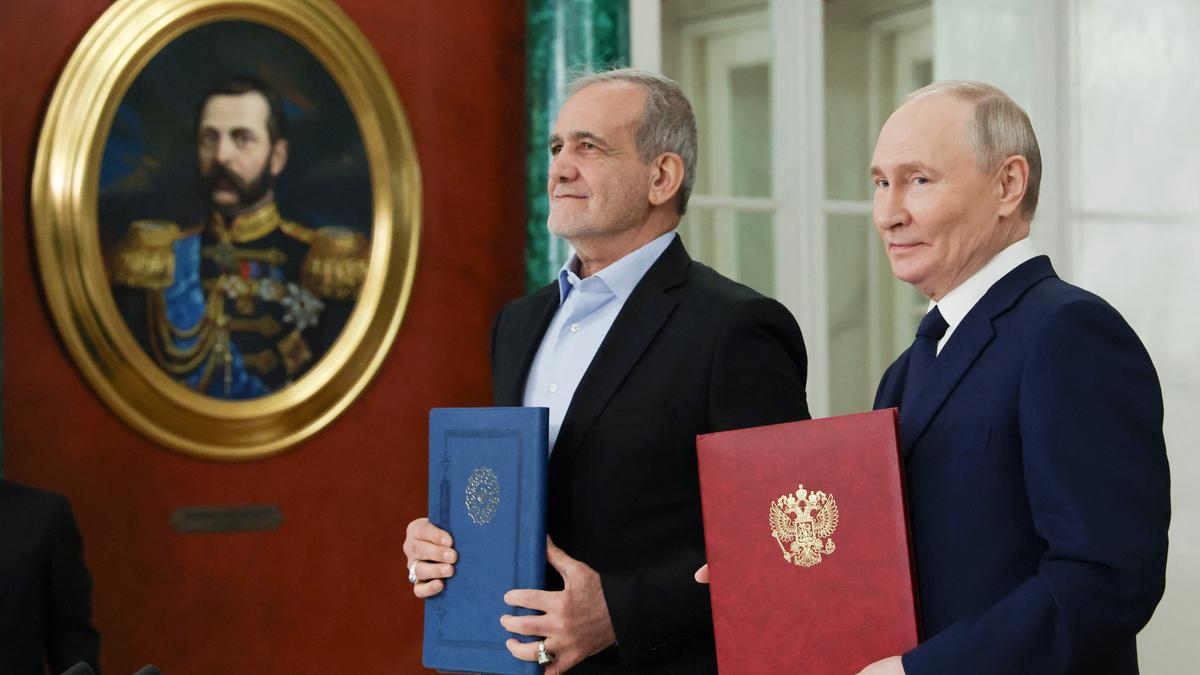Russia and Iran Strengthen Ties Amidst Western Sanctions: A New Era of Strategic Partnership?
The recent signing of a comprehensive strategic partnership treaty between Russia and Iran marks a significant development in the geopolitical landscape. This unprecedented agreement, covering everything from trade and military cooperation to education and cultural exchange, signals a deepening alliance between the two nations in the face of escalating Western sanctions. But is this truly a new era, or a temporary alliance born of necessity? Let's delve into the details of this groundbreaking pact and what it might mean for the future.
A Comprehensive Partnership: Unprecedented Cooperation
The sheer breadth of the agreement is striking. It goes far beyond mere economic cooperation. The deal touches upon military collaborations, paving the way for increased defense technology sharing and possibly joint military exercises. This is significant considering the challenges both nations face from global powers. The treaty also delves into the educational and cultural spheres, solidifying a connection far beyond transactional relationships. Think joint research initiatives, cultural exchanges and educational programs that go beyond textbooks; it’s about forging deeper cultural ties and building bonds among their citizens.
Economic Interdependence: Beyond Trade Deals
This is not merely a trade deal; it represents a substantial restructuring of economic interactions between Moscow and Tehran. Plans are underway to ship Russian natural gas to Iran, as well as constructing new transport corridors that funnel access through Iranian ports in the Gulf. These projects signal a serious level of integration, moving beyond simple trading of goods and entering a new stage of strategic economic symbiosis. Think reduced dependency on external markets and mutual security and prosperity; together, they will likely impact international markets significantly.
Military Collaboration: Shared Concerns and Potential
The cooperation isn't just about economic integration, though. It signals a critical aspect of defense collaborations. With both countries facing Western pressure, particularly concerning potential attacks from Israel, and accusations from Ukraine regarding the supply of drones for use in attacking Ukraine (which both countries deny), this collaboration will likely involve advanced arms sales. It's a partnership built on shared security concerns and offers potential synergies concerning military and strategic intelligence.
Geopolitical Implications: Reshaping the Global Order?
The Russia-Iran partnership comes at a critical juncture in global politics, as international tensions remain extremely high, fueled by existing conflicts and emerging threats. Both Russia and Iran seem determined to move ahead regardless of international pressure. The strengthening of their ties cannot be disregarded, particularly given the increasingly complicated global landscape.
A Counterweight to Western Influence?:
The deal can also be seen as an attempt to create a counterbalance to the United States' global influence and Western sanctions. The treaty clearly marks the solidifying of relations between Moscow and Tehran. Considering both nations have endured prolonged economic sanctions from the West, the deal reflects their joint opposition to Western pressure. The collaboration is far from surprising and signals both countries' mutual interests in avoiding global hegemony.
Regional Stability or Increased Tensions?:
The implications for regional stability are complex. Some analysts fear this partnership will further destabilize the Middle East. Others believe the closer alignment between Russia and Iran may foster regional peace through enhanced communication. Regardless of whether this cooperation increases or decreases regional stability, this treaty shows a critical move for both nations and sets a crucial new international stage.
The Future of Russia-Iran Relations: Enduring Partnership or Strategic Convenience?
Whether this partnership endures will be shaped by developments over the coming years. However, several significant elements are noteworthy here:
Mutual Dependence: An Enduring Factor:
The treaty comes as Russia increasingly needs Iranian support amidst its conflict in Ukraine, and Iran needs Russia’s military expertise and technology as it navigates regional conflicts and pressure from the West.
Economic Considerations: Maintaining Stability:
The mutually beneficial economic agreements help improve the quality of life for each country's population and may further cement the lasting nature of their partnership.
Global Geopolitics: Adaptability is Key:
International pressures may be a key deciding factor in whether this relationship will be sustainable long-term.
Take Away Points:
- The Russia-Iran partnership is far-reaching, extending to various sectors.
- This pact signifies increased interdependence and collaboration, driven partly by Western sanctions and geostrategic considerations.
- The alliance may shift global power dynamics and impact regional stability, bringing significant changes to global relations.
- Both economic and security components of this new relationship are fundamental and significant.









